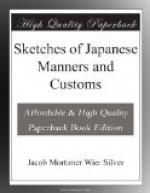CHAPTER VI.
The ‘Hara Kiru.’
Although we have long been aware of the existence of this peculiar mode of suicide, the exclusive policy of the Japanese has placed insuperable difficulties in the way of obtaining accurate information concerning it.
A more enlightened policy is now gaining ground in the country. The chromo-lithographs that illustrate these ‘Sketches’ are fac-similes of paintings by native artists, selected from a series lately published at Yeddo, and sold to foreigners with the connivance, if not by permission, of the authorities; for the spy system in Japan is so perfect, that illicit dealings are next to impossible.
As Japanese punishments entail disgrace on every member of the culprit’s family, the ‘Hara Kiru,’ or ‘happy dispatch,’ which is the only exception, is regarded as a great privilege by the classes entitled to avail themselves of it These consist of the nobility, military, and official of a certain rank holding civil appointments.
It seems to be a prevalent idea that this sacrifice is reserved for political offences; but this is not the case, as crimes of all descriptions are condoned by it.
A simple act of suicide does not constitute the ‘Hara Kiru.’ To render the act legal, and to ensure the heir and family of the person performing it against disgrace and loss of property, an order for its performance must be issued by the Tycoon, or by the suzerain prince of the culprit.
[Illustration: The Tycoon’s messengers reading the sentence.]
The Japanese, being a high-spirited and patriotic people, consider that death under any circumstances is preferable to dishonour; and the privileged classes always carry about with them when they travel the paraphernalia used at the performance of the ‘Hara Kiru,’ in token of their readiness to prove their patriotism, or to die rather than disgrace their family.
The dress consists of a robe and ‘harakama,’ or ’winged official dress,’ of coarse white cloth—white being the funeral colour of the country—which is undistinguished by the crest or any sign of the rank of the owner. There is also the disembowelling knife, the blade of which is about eight inches long, and very sharp.
When the sentence of the ‘Hara Kiru’ is awarded, or the humble request of a defeated politician to perform it is acceded to, a formal document is made out and duly signed by the competent authorities. It is then delivered to two commissioners, by whom it is conveyed to the culprit.
Should the proposed victim be a Daimio of importance, and sufficiently powerful to set the Tycoon at defiance, the delivery of the imperial mandate is likely to be attended with unpleasant results, as the bearers are sometimes waylaid and murdered by retainers of the doomed prince, and have frequently to resort to stratagem to accomplish their task. But when once the mandate is delivered, the prince must submit, or he would lose caste even with his own followers, so strongly are the Japanese imbued with respect for the ancient customs of their country.




